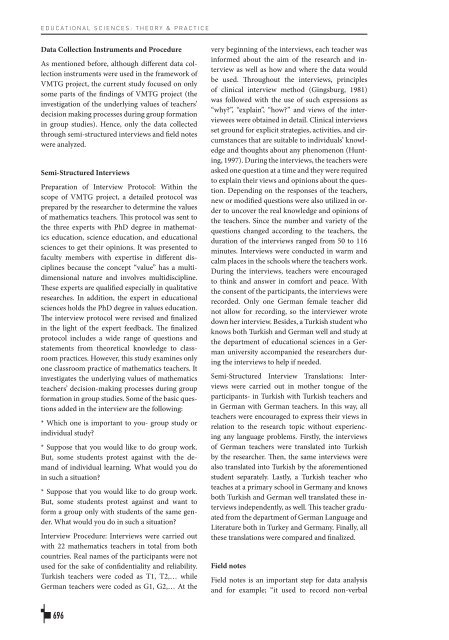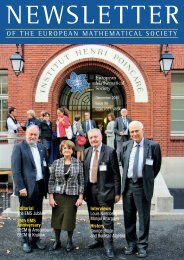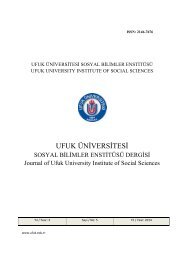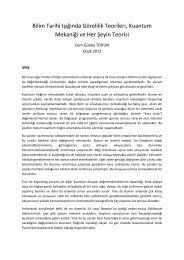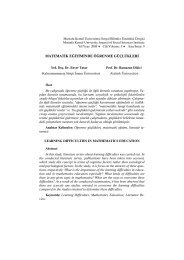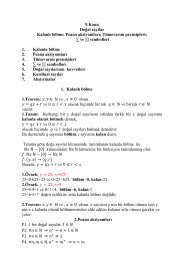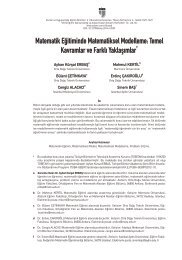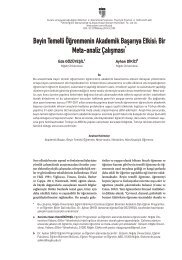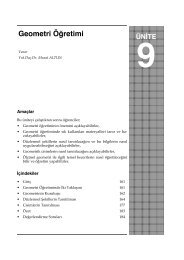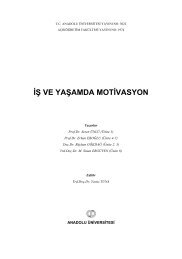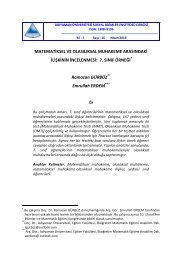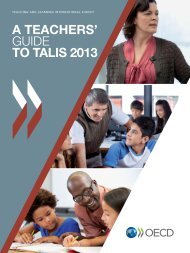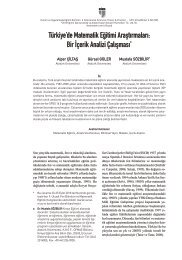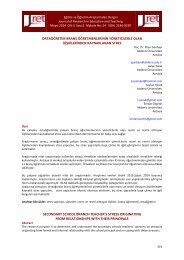bd798f7e557c386e7e231ced888acec57061
bd798f7e557c386e7e231ced888acec57061
bd798f7e557c386e7e231ced888acec57061
- No tags were found...
You also want an ePaper? Increase the reach of your titles
YUMPU automatically turns print PDFs into web optimized ePapers that Google loves.
EDUCATIONAL SCIENCES: THEORY & PRACTICE<br />
Data Collection Instruments and Procedure<br />
As mentioned before, although different data collection<br />
instruments were used in the framework of<br />
VMTG project, the current study focused on only<br />
some parts of the findings of VMTG project (the<br />
investigation of the underlying values of teachers’<br />
decision making processes during group formation<br />
in group studies). Hence, only the data collected<br />
through semi-structured interviews and field notes<br />
were analyzed.<br />
Semi-Structured Interviews<br />
Preparation of Interview Protocol: Within the<br />
scope of VMTG project, a detailed protocol was<br />
prepared by the researcher to determine the values<br />
of mathematics teachers. This protocol was sent to<br />
the three experts with PhD degree in mathematics<br />
education, science education, and educational<br />
sciences to get their opinions. It was presented to<br />
faculty members with expertise in different disciplines<br />
because the concept “value” has a multidimensional<br />
nature and involves multidiscipline.<br />
These experts are qualified especially in qualitative<br />
researches. In addition, the expert in educational<br />
sciences holds the PhD degree in values education.<br />
The interview protocol were revised and finalized<br />
in the light of the expert feedback. The finalized<br />
protocol includes a wide range of questions and<br />
statements from theoretical knowledge to classroom<br />
practices. However, this study examines only<br />
one classroom practice of mathematics teachers. It<br />
investigates the underlying values of mathematics<br />
teachers’ decision-making processes during group<br />
formation in group studies. Some of the basic questions<br />
added in the interview are the following:<br />
* Which one is important to you- group study or<br />
individual study<br />
* Suppose that you would like to do group work.<br />
But, some students protest against with the demand<br />
of individual learning. What would you do<br />
in such a situation<br />
* Suppose that you would like to do group work.<br />
But, some students protest against and want to<br />
form a group only with students of the same gender.<br />
What would you do in such a situation<br />
Interview Procedure: Interviews were carried out<br />
with 22 mathematics teachers in total from both<br />
countries. Real names of the participants were not<br />
used for the sake of confidentiality and reliability.<br />
Turkish teachers were coded as T1, T2,… while<br />
German teachers were coded as G1, G2,… At the<br />
very beginning of the interviews, each teacher was<br />
informed about the aim of the research and interview<br />
as well as how and where the data would<br />
be used. Throughout the interviews, principles<br />
of clinical interview method (Gingsburg, 1981)<br />
was followed with the use of such expressions as<br />
“why”, “explain”, “how” and views of the interviewees<br />
were obtained in detail. Clinical interviews<br />
set ground for explicit strategies, activities, and circumstances<br />
that are suitable to individuals’ knowledge<br />
and thoughts about any phenomenon (Hunting,<br />
1997). During the interviews, the teachers were<br />
asked one question at a time and they were required<br />
to explain their views and opinions about the question.<br />
Depending on the responses of the teachers,<br />
new or modified questions were also utilized in order<br />
to uncover the real knowledge and opinions of<br />
the teachers. Since the number and variety of the<br />
questions changed according to the teachers, the<br />
duration of the interviews ranged from 50 to 116<br />
minutes. Interviews were conducted in warm and<br />
calm places in the schools where the teachers work.<br />
During the interviews, teachers were encouraged<br />
to think and answer in comfort and peace. With<br />
the consent of the participants, the interviews were<br />
recorded. Only one German female teacher did<br />
not allow for recording, so the interviewer wrote<br />
down her interview. Besides, a Turkish student who<br />
knows both Turkish and German well and study at<br />
the department of educational sciences in a German<br />
university accompanied the researchers during<br />
the interviews to help if needed.<br />
Semi-Structured Interview Translations: Interviews<br />
were carried out in mother tongue of the<br />
participants- in Turkish with Turkish teachers and<br />
in German with German teachers. In this way, all<br />
teachers were encouraged to express their views in<br />
relation to the research topic without experiencing<br />
any language problems. Firstly, the interviews<br />
of German teachers were translated into Turkish<br />
by the researcher. Then, the same interviews were<br />
also translated into Turkish by the aforementioned<br />
student separately. Lastly, a Turkish teacher who<br />
teaches at a primary school in Germany and knows<br />
both Turkish and German well translated these interviews<br />
independently, as well. This teacher graduated<br />
from the department of German Language and<br />
Literature both in Turkey and Germany. Finally, all<br />
these translations were compared and finalized.<br />
Field notes<br />
Field notes is an important step for data analysis<br />
and for example; “it used to record non-verbal<br />
696


